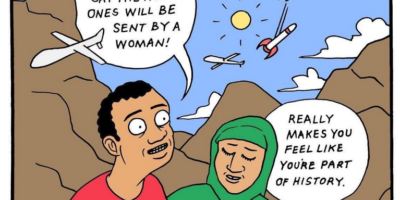By Our man in Amsterdam
A new documentary on the squatters’ movement by João Romão, a Portuguese economist and activist living in Amsterdam, has just been released. Squatted Freedom, a one-hour limited-budget film, combines archival footage and interviews with current and former squatters to examine the history and politics of the movement as well as the wave of recent, violent evictions of squats in Amsterdam.
Squatted Freedom is a fascinating film. The story of the squatters’ movement, past and present, is both captivating and inspiring. Violent confrontations between police and squatters have been taking place since the 1980s and continue into the present. Squatted Freedom reaches its climax during an intense standoff and eventual confrontation between squatters and riot police attempting to evict a prominent Amsterdam squat, a scene which Romão and his colleagues were lucky enough to capture on film.
The film is also a great example of what amateur filmmakers can do with a limited budget and ample commitment. It will be of interest to anyone involved in autonomous, anarchist or other streams of radical left and anti-capitalist activism—as well as for anyone interested in knowing more about the history, culture and politics of Amsterdam.
I recently asked Romão to tell me about the film, the movement, and its significance in terms of contemporary economic and political conditions. Here is part of our conversation:
Our Man: You are from Portugal, why did you want to make a film about the squatter’s movement in Amsterdam?
João Romão: The Netherlands has some particular political solutions in the European context: it was the first West European country to legalize abortion. Occupation of empty houses was allowed, prostitution is legalized as a profession, soft drugs can be legally purchased in the famous coffee-shops.At the same time, it’s one of the European countries with the lowest levels of social inequality.
I lived in Amsterdam for two years and when I arrived, a right wing government had been elected for the first time since the World War II. This government is clearly attacking all these particular characteristics of the Dutch society and the prohibition of squatting was one of the first measures they took. I wanted to show this case as an example of the political transformations in the Netherlands.
OM: What are the politics behind the squatter’s movement?
JR: Fifty years have passed since the 1960s and the movement has had different attitudes in different historical movements. Until the 1980’s, it was mostly focused on the housing problem and it became extremely relevant in some cities, especially in Amsterdam where there were tens of thousands of squatters at the time. Today there are only some hundreds. In the mid-1980’s, police started a campaign of strong repression against these groups, which led to a number of extremely violent confrontations. Many people left the movement at that time and much of the popular support has been lost.
After that, in the 1980s, squatting started to be much more connected to cultural activities: groups of artists occupied large buildings, like abandoned shipyards, in order to develop spaces for cultural activities. The government and the city councils tried to negotiate with these groups, most of the time buying the buildings and then renting (or selling) them to the squatters. Nevertheless, in a larger or smaller scale, and for residential or cultural purposes, it has always been a movement based on autonomous self-organization with anti-capitalist principles.
OM: Squatting recently became illegal in the Netherlands. Can you explain why and what this has meant for the squatter community?
JR: Basically, the occupation of empty buildings is an obstacle to the market regulation of the cities: today most of the cities are facing a process of gentrification of their centers, with very expensive places for offices or houses. The occupation of empty buildings is a very strong enemy of the neoliberal approaches to urban development. For the right-wing government of the Netherlands, this is a measure to defend “free-markets.” For the squatter movement, it is an opportunity for re-politicization.
In fact, the Netherlands now has the same [neoliberal] laws as the other European countries. Squatting has clearly become a tool to fight the neoliberal agenda. On the other hand, there are many more risks: as squatting is now a criminal activity, people can be arrested or suffer strong attacks from riot police, as has been happening in the last year.
OM: What, in your mind, are the most interesting and important aspects of the squatters’ movement?
JR: The most interesting aspects of these groups are their clear anti-capitalist position, the strong linkage to local communities (once squatters take over a space, they normally engage in social and cultural activities with their neighbors), and the idea of self-organization (groups of persons organized in horizontal structures and supporting each other).
OM: How do you situate the movement in the overall political and economic picture of Europe and the Netherlands?
JR: The movement is much smaller than before and has lost much of its popular support. Nevertheless, the problems it attempts to address—lack of space for young people to live or work on cultural and artistic activities—have not been solved in the Netherlands. On the other, the neoliberal agenda of the Dutch right-wing government also has implications for other social issues, like the deregulation of labor markets or the cuts in public services, and on the liberties the Dutch people conquered in the last decades, like the free consumption of soft drugs. This implies a big challenge for a movement that traditionally operates autonomously: how to create new networks of solidarity with other social movements against neoliberalism.
Trailer and clips for Squatted Freedom exist on YouTube, but look for the film to be screened in Lexington in the near future.



Michael Marchman
A couple of minor clarifications/corrections…
1. Romao is not exactly an “amateur filmmaker” as the article suggests. He has, in fact, worked in journalism for many years although this is his first documentary film.
2. The article implies that the film was made on a very small budget. In fact, Romao was supported/funded (in part) by Portuguese public television, which has aired the film.
Apologies to Romao for these mischaracterizations.